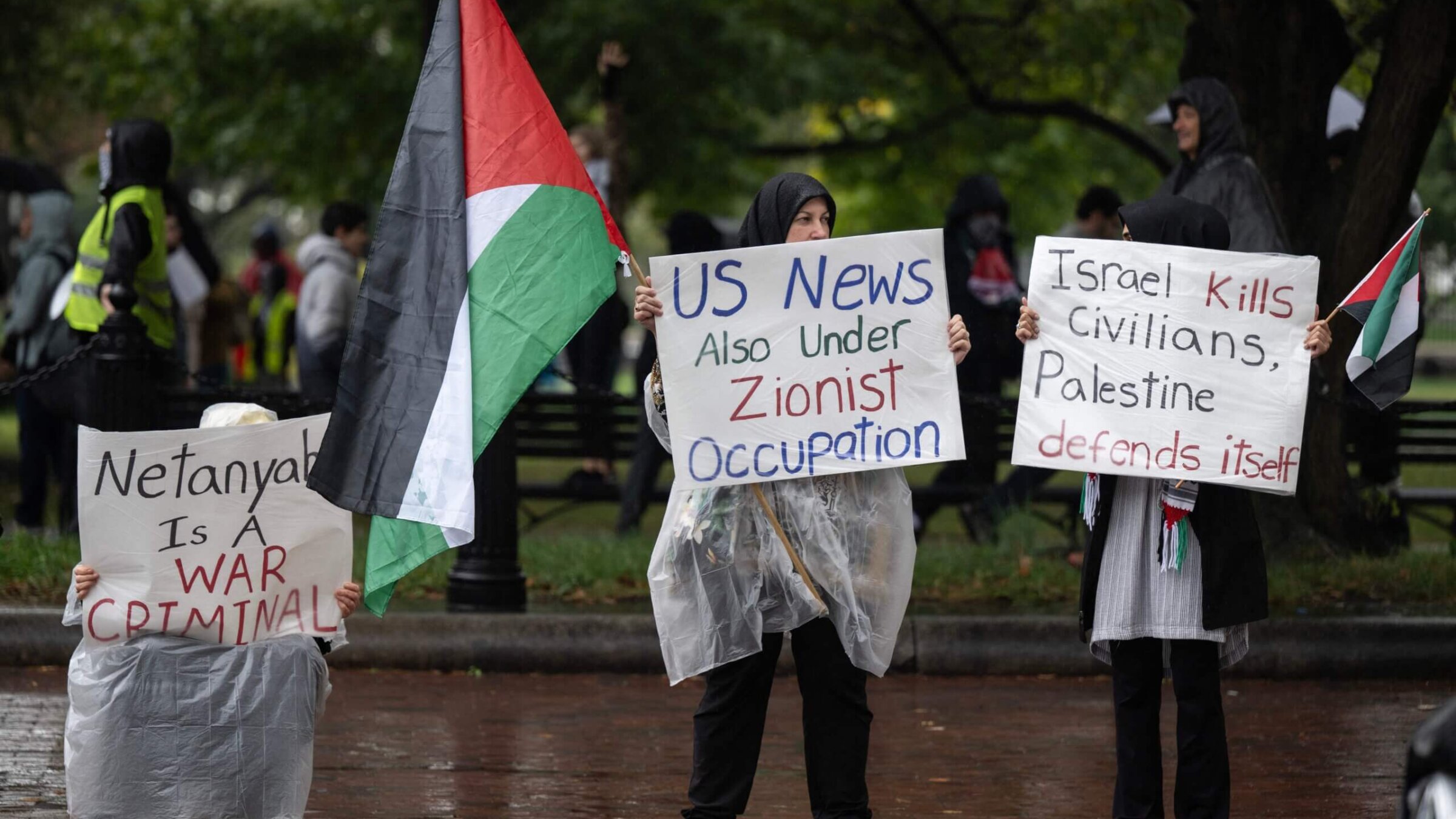Why won’t UC Berkeley condemn the hate speech of people who celebrate a pogrom?
Campuses have split over how to protect free speech and students. This war has proved their failure

People demonstrate during a pro-Palestine rally at Lafayette Square in front of the White House in Washington, DC, on October 14, 2023. Photo by Andrew Caballero-Reynolds/AFP via Getty Images
As soon as Hamas unleashed its barbaric fury on southern Israel, student groups at the University of California, Berkeley, where I teach, began issuing and endorsing statements proclaiming “honor,” “glory,” and “unwavering support” for the so-called “indigenous resistance” in Gaza, and holding vigils for the “martyrs” who fell for that cause.
How have such incomprehensibly cruel sentiments become not only permissible but commonplace, not just at UC Berkeley, but at campuses across the country?
One answer runs back at least a decade, to the academic push of the Boycott, Divestment, and Sanctions movement against Israel. For years, resolutions demanding academic boycotts and university divestment from Israel attracted attention like a curiosity show; performance theater featuring fringe academic associations led by pseudo-radical professors, pontificating from soapboxes beneath palm trees. Dismissed as peripheral by the mainstream media, advocates of BDS nonetheless found safe spaces and supporters on campuses, in part because of their insistence that their anti-Zionism was not antisemitism.
That distinction, however, has just been exposed as one without a difference.
To hail the “revolution” Hamas has undertaken for a “liberated Palestine” is to take a page from the BDS playbook. And it is also hard to imagine anything more damaging to the cause of an independent Palestinian state — or even a joint Israeli/Palestinian binational state — than to conflate Hamas with Palestinians and to hail Hamas’ horror show as advancing Palestinian liberation.
For example, the American Studies Association’s 2013 “Resolution on Academic Boycott of Israel” decried the “Israeli occupation of Palestine.” It was left purposely vague whether the “occupation” referred to Israel’s annexation of the West Bank, the Gaza Strip, the Golan Heights, the Sinai peninsula and east Jerusalem, which Israel itself defined as such under international law, or to Israel’s establishment in 1948, which Hamas and other anti-Zionists call occupation, even though it is not. Better to obfuscate in order to build a big tent.
But now BDS-supporting groups both on and off campus are celebrating an attack on land that the United Nations in 1947, the United States in 1948 and some Arab countries since have clearly recognized as Israel proper. The veil of “end the Israeli occupation of Palestine” has been lifted. Beneath it, the meaning becomes clear: eradication of the sovereign, internationally recognized state of Israel itself, as if the slogan “from the river to the sea” wasn’t clear enough.
Universities must protect the right to speech, including noxious speech. At the same time, principles of free speech dictate that “bad” speech can and should be met with “good” speech. Yet, Berkeley campus leadership — from the chancellor’s office to our Division of Equity and Inclusion — has chosen not to use their offices to disavow hate speech that’s not only being voiced, but cheered (though the Chancellor and Provost, to their credit, did just sign onto a strong faculty letter along with some 300 others).
Berkeley’s leadership has not been shy about issuing statements on major national and international events unfolding beyond campus, such as the murder of George Floyd. Some of those statements, like the heartfelt one the chancellor sent in response to the Supreme Court’s 2022 decision overturning abortion rights, are on politically controversial topics. Some of those topics are far more morally ambiguous than the one at hand: registered student groups celebrating a pogrom led by an avowedly antisemitic terrorist organization bent on erasing an entire nation-state.
Rarely will campus leaders find an issue on which the moral compass points more steadfastly in one direction than here. So why the silence? If not now, when?
One answer is that they believe that campus comity is best served by letting such speech go unrebutted, lest it trigger an angry reaction on the part of those who take umbrage at having their hate speech repudiated. Better to remain mute than to stoke the coals of discord.
Another answer is that Jews (and, by extension, the Jewish state) have a difficult time fitting into the liberal/left conversation about diversity, equity and inclusion, which centers on “underrepresented minorities.” From this perspective, Jews are “white” and therefore “overrepresented,” even though Jewish adults make up barely 2% of the U.S. population. So antisemitism, which is often fueled by conspiracy theories and contempt for Jewish overrepresentation, becomes either illegible or not worthy of concern.
Israel has, is, and will continue to provide plenty of fodder for criticism (myself included) for its actions in Gaza, the occupied West Bank, and elsewhere. Such criticism is not inherently antisemitic, not hate speech, and is important. Heated debate over Israel’s actions will continue, as it should. That’s what a university is for.
But for campus leadership to not condemn campus speech that dances on the graves of butchered and burned Israelis — from infants to elderly — is not debatable. To refuse to denounce it serves only to continue to condone it and to allow it to fester.
To contact the author, email [email protected].






















